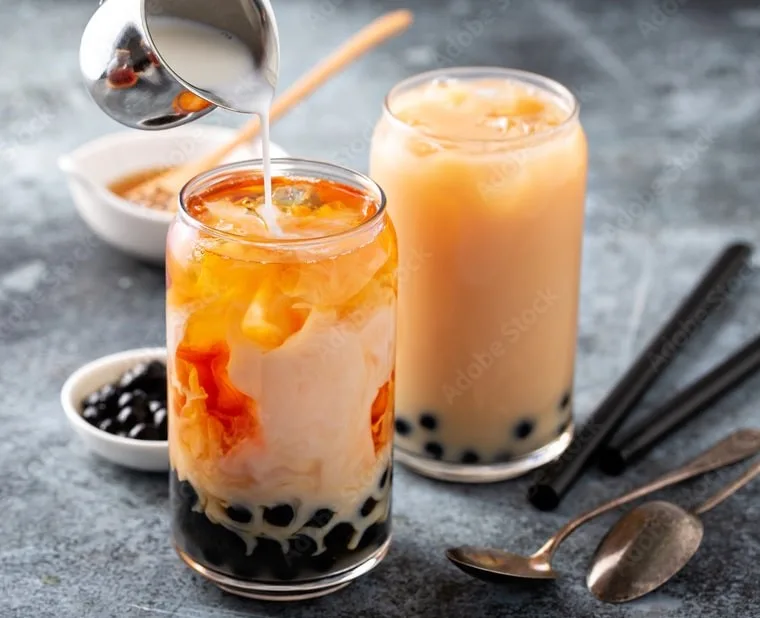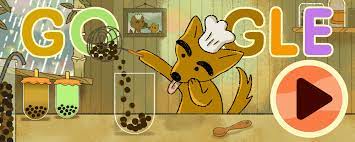Detailed report what you must know about bubble tea
Why google is celebrating and promoting Bubble tea worldwide ?
Google has created a doodle to celebrate the popularity of bubble tea. Doodles are illustrations or animations that appear on the Google homepage to celebrate special events or commemorate important people or milestones. Google creates many doodles throughout the year to mark various holidays, anniversaries, and significant events. The doodles are usually interactive, allowing users to play games or learn more about the subject being celebrated.

History of bubble tea
Bubble tea, also known as pearl milk tea or boba, is a Taiwanese tea-based drink that was created in the 1980s. It is made with black or green tea, milk, and sugar, and can be served hot or cold. The signature aspect of bubble tea is the addition of chewy tapioca pearls, also known as “bubbles,” at the bottom of the cup.
The exact origin of bubble tea is debated, but it is generally credited to tea shops in Taichung, Taiwan. One story attribute the creation of bubble tea to a tea shop owner who added tapioca pearls to her tea as a playful experiment. The drink quickly gained popularity and spread to other parts of Taiwan and eventually to other countries.
Today, bubble tea is a beloved treat enjoyed by millions of people around the world. There are many variations of the drink, including flavoured teas, smoothies, and fruity teas with bubbles. The popularity of bubble tea continues to grow, and new bubble tea shops are opening regularly.
Major health benefits of drinking bubble tea
Bubble tea can offer some potential health benefits, although it is also high in sugar and calories. Some benefits include:
- Hydration: As bubble tea is made with tea, it can provide hydration and refreshment.
- Antioxidants: Tea, whether black or green, is a good source of antioxidants that can help protect the body from damage caused by free radicals.
- Energy boost: Bubble tea often contains caffeine from the tea, which can provide a quick energy boost.
- Relaxation: Tea is also known to have a calming effect, and drinking bubble tea can help promote relaxation and reduce stress.
It is important to keep in mind that bubble tea can be high in sugar and calories, so it should be consumed in moderation as part of a balanced diet. Additionally, some bubble tea drinks can contain artificial ingredients and preservatives, so it’s important to read the ingredients label and choose a high-quality, all-natural bubble tea.
Bubble tea and Cancer
There is no direct evidence linking bubble tea consumption to an increased risk of cancer. However, some ingredients used in bubble tea, such as boba or tapioca pearls, contain small amounts of a chemical called brominated vegetable oil (BVO). BVO is a food additive that has been linked to potential health concerns, including an increased risk of cancer in animal studies.
It is important to note that the levels of BVO in bubble tea are generally low and considered safe for consumption by most regulatory agencies, including the U.S. Food and Drug Administration (FDA). However, if you have concerns about BVO, it’s best to choose bubble tea made with all-natural ingredients and to limit your overall consumption of processed foods and drinks.
As with any food or drink, it’s important to maintain a balanced diet and limit your consumption of high-sugar, high-calorie drinks, including bubble tea, as part of a healthy lifestyle.
Immune system and bubble tea
Bubble tea can have both positive and negative effects on the immune system, depending on the ingredients used and the frequency of consumption.
On the positive side, some ingredients in bubble tea, such as tea and antioxidants, have been shown to have immune-boosting effects and can help support a healthy immune system. For example, green tea contains polyphenols, which have been shown to have antiviral and anti-inflammatory effects.
On the negative side, bubble tea can also contain high amounts of sugar and artificial ingredients, which can negatively impact the immune system. Consuming high levels of sugar can suppress the immune system and reduce the body’s ability to fight off infections and disease. Artificial ingredients and preservatives in bubble tea can also have harmful effects on the immune system.
It is recommended to choose bubble tea made with all-natural ingredients and to limit your overall consumption of high-sugar, high-calorie drinks, including bubble tea, as part of a healthy lifestyle. Maintaining a balanced diet, getting regular exercise, and getting adequate sleep can also help support a strong and healthy immune system.
Who should drink bubble tea and who should not?
Bubble tea can be enjoyed by anyone who likes the taste and is not allergic to any of the ingredients used in the drink. However, some individuals may want to limit their consumption of bubble tea or avoid it altogether due to its high sugar content and potential negative effects on health.
For example, people with diabetes or those who are trying to manage their blood sugar levels should limit their consumption of bubble tea as it can contain high levels of sugar. Pregnant women should also be cautious about their consumption of bubble tea, as the caffeine and sugar content can have potential harmful effects.
It is important to keep in mind that bubble tea should be consumed in moderation as part of a balanced diet, and to choose bubble tea made with all-natural ingredients whenever possible. If you have any specific health concerns, it’s best to consult with your healthcare provider before incorporating bubble tea into your diet.
Bubble tea market size worldwide
The bubble tea market size has been growing rapidly in recent years, with the global bubble tea market estimated to reach USD 2.8 billion by 2025, growing at a CAGR of 7.6% from 2020 to 2025. The popularity of bubble tea, especially among younger generations, has driven the growth of the market, as well as the expansion of bubble tea shops and franchises.
The Asia-Pacific region is the largest market for bubble tea, driven by countries such as China, Taiwan, and South Korea, where bubble tea originated and has a long history of popularity. The region is expected to continue to be the largest market for bubble tea in the coming years.
The growing popularity of bubble tea in other regions, such as North America and Europe, has also contributed to the growth of the global bubble tea market. The increasing demand for customizable and healthier options, as well as the rise of e-commerce platforms and home delivery services, are some of the factors driving the growth of the bubble tea market worldwide.
Major companies producing bubble tea worldwide
Here are some of the major companies producing bubble tea worldwide:
- Gong Cha
- Sharetea
- Boba Guys
- Chatime
- Kung Fu Tea
- CoCo Fresh Tea & Juice
- Quickly
- iTea
- Daboba
- Royaltea
Drivers of bubble tea market
The following are the main drivers of the global bubble tea market:
- Popularity among younger generations: Bubble tea has become increasingly popular among younger generations, especially millennials and Gen Z, who are driving the growth of the market.
- Customizability: The ability to customize bubble tea with different flavors, toppings, and sweetness levels has increased its appeal among consumers.
- Expansion of bubble tea shops and franchises: The growth of bubble tea shops and franchises has helped to expand the market and make bubble tea more accessible to consumers.
- Healthier options: Consumers are increasingly looking for healthier options, and bubble tea shops have responded by offering more nutritious ingredients, such as organic tea and natural sweeteners.
- Convenient access: The rise of e-commerce platforms and home delivery services has made bubble tea more convenient to purchase and has contributed to the growth of the market.
- Social media influence: The popularity of bubble tea has been amplified by its presence on social media platforms, where consumers share photos and reviews of their favorite bubble tea drinks.
- Growing food and beverage industry: The growing food and beverage industry is creating more opportunities for the bubble tea market to expand, as consumers are increasingly looking for new and innovative food and beverage options.
Major export market for bubble tea worldwide
Bubble tea has gained popularity globally and there is a growing demand for bubble tea ingredients and supplies, such as tapioca pearls, tea leaves, and syrups. Some of the major export markets for bubble tea worldwide include:
- Asia: countries such as Taiwan, China, and Thailand are major exporters of bubble tea products and ingredients.
- North America: The United States and Canada are also growing markets for bubble tea and export bubble tea-related products to other countries.
- Europe: countries such as the United Kingdom and Germany have seen a growing demand for bubble tea and import bubble tea-related products from Asia.
- Australia: the demand for bubble tea has also been increasing in Australia and imports bubble tea-related products from other countries.
Bubble tea in USA & UK
Bubble tea has gained popularity in the USA in recent years, with many bubble tea shops opening in cities across the country. The trend has been driven by a combination of interest in unique and flavourful drinks, as well as the social media popularity of bubble tea. It has become a popular drink among young people and is often seen as a trendy, Instagram-worthy beverage.
Bubble tea has become increasingly popular in the UK in recent years, with many bubble tea shops opening in cities such as London and Manchester. Bubble tea has been embraced by the UK for its unique and refreshing taste, as well as its fun and playful appearance. The trend has been driven by the younger generation, who are always looking for new and exciting things to try, and it has quickly become a staple drink in the UK’s food and drink scene.
How much a cup of bubble tea costs worldwide
The price of a cup of bubble tea can vary widely depending on the location and the type of bubble tea being purchased. On average, a cup of bubble tea can cost anywhere from $3 to $7 USD in the United States, while in the United Kingdom, a cup can cost anywhere from £3 to £5 GBP. In Asia, where bubble tea originated, prices can be lower, with a cup of bubble tea often costing around $1 to $3 USD. It is important to note that the cost of a cup of bubble tea can also be influenced by factors such as the cost of ingredients and the local economy.
Can bubble tea replace Indian tea?
Bubble tea and Indian tea serve different purposes and cater to different tastes and preferences. While bubble tea has become a popular trend and a unique drink in its own right, it is unlikely that it will completely replace traditional Indian tea, which is deeply rooted in the culture and history of India. Indian tea has its own unique flavor profile and is often enjoyed with a variety of spices and sweeteners, and is considered an important part of daily life for many people in India. Bubble tea may coexist with Indian tea and cater to a different demographic or occasions, but it is unlikely to fully replace it.
